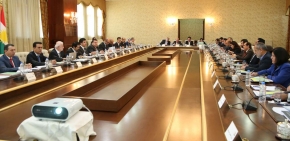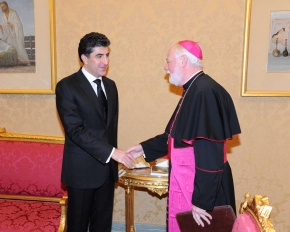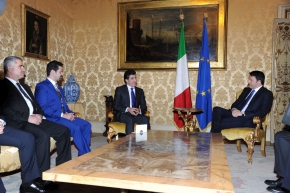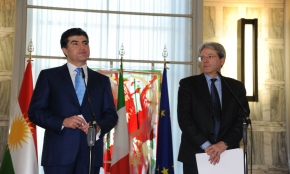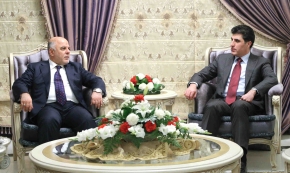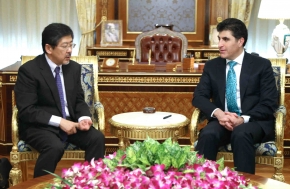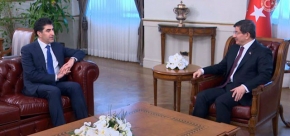Erbil, Kurdistan Region, Iraq, (gov.krd) – A meeting between Kurdistan Regional Government’s Oil and Gas Council and a delegation from Kurdistan Parliament was held yesterday to discuss the financial crisis in the Kurdistan Region and the pending issues between Erbil and the Federal Government of Iraq.
Kurdistan Parliament’s delegation included the Speaker, his two deputies, the heads of political parties’ parliamentary groups, head of the energy and natural resources committee and head of the economic, financial and investment parliamentary committee. The Kurdistan Regional Government’s Oil and Gas Council included KRG Prime Minister, Deputy Prime Minister, Minister of Natural Resources, Minister of Finance and Economy and Minister of Planning.
They discussed the latest developments in Kurdistan and Iraq and, focusing particularly on the budget, natural resources and ways to implement genuine reforms aimed at easing the financial crisis which the Kurdistan Region is going through.
They stressed the importance of adopting a unified Kurdish policy and stance towards Baghdad. It was agreed that the continuation of dialogue between Erbil and Baghdad was necessary and work to ensure that the Kurdistan Region receives its share from Iraq’s federal budget which was approved earlier this year by the Iraqi parliament.
They agreed on the need for increased cooperation between the Parliament of Kurdistan and the Kurdistan Regional Government particularly in adopting plans that would help easing the financial crisis. The need to undertake reforms in a number of sectors, coupled with increased transparency across all government institutions and ministries, were also discussed in the meeting.
The members of the Kurdistan Parliament delegation reiterated their support to the Kurdistan Regional Government in its efforts to establishing a road map for settling the current crisis that the Kurdistan Region passes through. It was, finally agreed that the Kurdistan Regional Government’s Ministry of Natural Resource will publish all the information related to its activities on a weekly basis on its official website, particularly those related to the amounts of oil produced and exported.
Erbil, Kurdistan Region, Iraq, (gov.krd) - As part of the Kurdistan Regional Government delegation’s visit to the Vatican, Prime Minister Nechirvan Barzani and his accompanying delegation yesterday met the Vatican Foreign Minister, Archbishop Paul Richard Gallagher.
The two sides discussed bilateral relations between the Kurdistan Region and the Vatican. Foreign Minister Archbishop Gallagher said that the Vatican closely observes and follows up the situation in the Kurdistan and the wider region. He added that he is glad to hear about the situation in the Kurdistan Region and the wider Middle East from the KRG delegation.
The talks focused on the current war against the Islamic State terrorist organization, ISIS, and Kurdistan Peshmerga Forces progress on the frontline. The situation of Iraqi internally displaced people and Syrian refugees, who fled the violent repression of ISIS and took refuge in the Kurdistan Region, was also highlighted in the meeting.
The Prime Minister reiterated that further assistance from donor countries and the international community are needed to help the refugees and IDPs.
The Vatican’s Foreign Minister praised Kurdistan Regional Government for providing shelter and assistance to the displaced people and refugees. He also praised the role played by the Peshmerga Forces in defending all the people of the region, regardless of their ethnicity or religion, against terrorism.
The KRG delegation included Deputy Prime Minister, Qubad Talabani, Minister of Endowments and Religious Affairs, Kamal Muslim, Head of the Department of Foreign Relations, Minister Falah Mustafa, KRG spokesperson, Minister Safeen Dizayee and the KRG Representative to Italy Ms Rezan Hama Salih.
Erbil, Kurdistan Region, Iraq (gov.krd) - Italian Prime Minister, Matteo Renzi, received yesterday in Rome a Kurdistan Regional Government delegation, headed by Prime Minister Nechirvan Barzani.
Prime Minister Barzani expressed the gratitude of the people and government of the Kurdistan Region to Italy for its provision of essential humanitarian and military assistance to the Kurdistan Region and for the visit last summer by the Italian Prime Minister to Erbil, which Prime Minister Barzani described as excellently timed as it helped show that the Kurdistan Region was supported, while facing serious terrorist threat.
He briefed the Italian Prime Minister about the latest developments in the Kurdistan Region and the continuous progress marked by the Peshmerga forces on the frontline against the Islamic terrorist organisation, ISIS. He also highlighted the situation of the displaced people from the rest of Iraq and the Syrian refugees who constitute a heavy burden on the Kurdistan Regional Government, stressing that they desperately need further assistance.
Italian Prime Minister Renzi reiterated that his government “will continue to provide humanitarian and military assistance to the Kurdistan Region, and in order to eradicate terrorism we will stand side by side with the Kurdistan Region in every way possible.” He also expressed his respect to the courage of the Peshmerga Forces in their fight against terrorism.
Mr. Renzi expressed his concern for the spread of terrorist organisations in other parts of the world, stressing the need to confront terrorism all together.
He added that Italy will support the Kurdistan Region because it has a strategic position, considering Italy as Kurdistan people’s friend.
Prime Minister Renzi stated that Italy has decided to upgrade its diplomatic representation in Erbil to Consulate General, considering that this move will send a message to the world that the situation in the Kurdistan Region is better than before. He stated, “It is important for us that Kurdistan Region’s stability continues.”
Both sides also discussed the relationship between Erbil and Baghdad, the situation in Mosul, political developments in Iraq and the importance of including all the components of Iraqi society in governance. They also discussed the situation in Syria and its repercussion on the situation in Iraq and the wider region. The two sides reiterated that a political solution is needed for the Syrian crisis.
The KRG delegation included Deputy Prime Minister, Qubad Talabani, Minister of Endowments and Religious Affairs, Kamal Muslim, Head of the Department of Foreign Relations, Minister Falah Mustafa, KRG spokesperson, Minister Safeen Dizayee and the KRG Representative to Italy Ms Rezan Hama Salih.
Erbil, Kurdistan Region, Iraq (gov.krd) - On the second day of its official visit to Italy, Kurdistan Regional Government delegation was received yesterday by the Italian Foreign Minister, Paolo Gentiloni.
The two sides discussed bilateral relations between the Kurdistan Region and Italy, the latest developments in the war against Islamic State terrorist organisation, ISIS, and the recent victories achieved by the Peshmerga Forces.
The liberation of the city of Mosul and the importance of including various Iraqi ethnic and religious groups in the operation in coordination with the international coalition forces, were highlighted in the talks.
The situation of the displaced Iraqis and Syrian refugees who fled ISIS violence and took refuge in the Kurdistan Region, the agreement reached between Erbil and Baghdad last December and the crisis in Syria and its repercussion on the neighbouring countries, were topics also discussed in the meeting.
Foreign Minister Gentiloni stressed his country’s commitment to provide humanitarian and military assistance to the Kurdistan Region. He reiterated what the Italian Prime Minister had announced the day earlier regarding upgrading Italy’s diplomatic representation to Consulate General. He added that this decision was the evidence of the importance that Rome places in its relationship with Erbil.
Prime Minister Barzani expressed his gratitude to the Italian government for supporting the Kurdistan Region in its fight against terrorism and for its decision to upgrade the level of its diplomatic representation in Erbil to Consulate General.
Regarding the relationship with Baghdad, Prime Minister said the Kurdistan Regional Government remains fully committed to the agreement that it signed with the federal Iraqi government, adding that the Kurdistan Regional Government was always ready to settle all the issues with Baghdad through dialogue and mutual understanding.
The meeting was also attended by KRG Deputy Prime Minister, Qubad Talabani, Minister of Endowments and Religious Affairs, Kamal Muslim, Head of the Department of Foreign Relations, Minister Falah Mustafa, KRG spokesperson, Minister Safeen Dizayee and the KRG Representative to Italy Ms Rezan Hama Salih.
Erbil, Kurdistan Region, Iraq, (gov.krd) – In a conference held in Erbil to discuss the results of a joint programme conducted by Kurdistan Regional Government and World Bank on the impact of internally displaced people on the Kurdistan Region’s economy and society, Prime Minister Nechirvan Barzani stressed the urgent need for additional assistance to address the crisis.
Prime Minister Barzani said, “The presence of close to two million refugees and IDPs has changed the demography of the Kurdistan Region; the population of the Region increased by 28 percent in 2014.” He stressed “The crises has placed a huge burden on the KRG, particularly in the sectors of education, health services, housing and related services, and employment.”
Following is the text of Prime Minister Barzani’s speech:
Ladies and Gentlemen,
Representatives from foreign countries,
Representatives of the World Bank,
Good morning to you all and welcome,
I am pleased to be here with you today to participate in this gathering to discuss the implementation of an important program pertaining to refugees and internally displaced persons (IDPs), and their impact on our Region’s economy and society.
I would like to thank the World Bank for accepting our request to assist in assessing the impact of refugees and IDPs on the socioeconomic life of the Kurdistan Region and the burden on the KRG.
I would also like to thank the KRG Ministry of Planning and relevant KRG organisations for the support they provided in conducting the assessment.
Ladies and gentlemen,
After 2003 the KRG embarked on a wide-ranging programme to achieve stability, economic development, and to improve all sectors in the Kurdistan Region. Some developments were achieved very quickly. Within a short period of time, our Region became a shining example on the map of the Middle East.
Regarding certain important issues and treatment by the Iraqi federal government we cannot deny the fact that we have had difficulties. Unfortunately, the previous Iraqi federal government did not take positive steps toward resolving outstanding issues; indeed, it further complicated the issues.
The impact of the Syria crisis has directly affected the Kurdistan Region. A significant number of Syrian refugees sought safe haven in our Region. Taking into consideration the international principles of human rights, we opened our doors and provided them with refuge and humanitarian assistance.
Due to worsening security elsewhere in the country, Iraqi citizens of all ethnic and religious backgrounds have been fleeing to our Region.
Triggered by overwhelming security events in Anbar, Salahuddin, and later Nineveh Governorates most displaced people arrived during the past one year. When Daesh (Islamic State terrorist organization) assumed control in Mosul and other areas, numerous Iraqi citizens became victims of brutal terror and ethnic cleansing, particularly Christians and Yezidis.
The sudden attacks by Daesh terrorists against the Kurdistan Region with advanced weapons captured from Iraqi army plunged the Kurdistan Region into an unwanted war. The Peshmerga forces performed their duty faithfully and continue to defend the security and dignity of the people of our Region along a frontline of more than one thousand kilometre long.
These crises occurred within a very short time and initially there was no plan on how to confront them. The former federal Iraqi government worsened the crisis. In early 2014 the federal government withheld the payment of Kurdistan Region employees’ salaries and complicated the federal budgeting process. In addition to dealing with humanitarian and security challenges, the Kurdistan Region also faced a serious financial crisis.
The KRG believes the current crisis will end. But today we need the international community to provide major additional military and humanitarian support to our Region.
The presence of close to two million refugees and IDPs has changed the demography of the Kurdistan Region; the population of the Region increased by 28 percent in 2014. The crisis has placed a huge burden on the KRG, particularly in the areas of education, health services, housing, and employment.
I reiterate my call to the international community to take the situation of the Kurdistan Region seriously and to urgently provide additional assistance.
The data and information being presented today by the Ministry of Planning and the World Bank are of great importance to our Region. It will help develop a road map to effectively address the financial and humanitarian challenges facing the Kurdistan Region.
The KRG pays serious attention to this study. Although the findings are not encouraging, it will help us deal with the humanitarian, security and financial challenges we face. This study highlights the impact of the current crisis on health and other sectors. We should deal with the findings carefully. Notably, in some areas the number of refugees and IDPs exceeds the local population.
The existence of such a large number of refugees and IDPs is causing a negative impact on the daily life of our people. Major impacts include price inflation of basic commodities and high unemployment. The people and the government of the Kurdistan Region are under significant pressures.
I am very proud of the welcoming attitude of our people towards refugees and IDPs who have sought refuge in our Region. But we have to be mindful that the KRG alone, with its limited resources, cannot adequately care for the people of the Kurdistan Region as well as refugees and IDPs.
Regrettably, the Federal Government of Iraq has not taken the issue of displaced people in the Kurdistan Region seriously enough. Even though IDPs are all Iraqi citizens, the federal government has not yet adequately addressed their needs. For the KRG to cover their needs, one billion and four hundred thousand US dollars will be needed this year.
I would like to extend my gratitude to the members of international coalition against Daesh, to UN Agencies and international organizations and governments for their support and solidarity in providing humanitarian and military assistance to our Region. We keep in mind, however, that considering the magnitude of the crisis we are in need of major additional assistance.
I would like to express my sincere gratitude to the people of the Kurdistan Region and to the staff of the KRG for their resilience and support during such critical times. Today the Kurdistan Region on the one hand faces funding constraints by the federal government and on the other hand is directly involved in the fight against Daesh.
The people of Kurdistan Region are experiencing a war situation that brings only destruction, calamity, and socioeconomic turmoil.
I also take this opportunity to thank our heroic peshmerga who fight a most brutal international terrorist organization with their limited resources to defend the security and stability of our Region. To effectively continue the fight and to successfully put an end to this war it is essential the international coalition provide our peshmerga with heavy weaponry and advanced military expertise.
It is expected that the fight against Daesh and the Syrian crisis to continue and the crisis facing the Kurdistan Region will not end in the near future. It is likely that more IDPs and refugees will seek refuge in our Region.
To strengthen our capacity to address the humanitarian and security crises it is thus very important to implement effective mechanisms in coordination with the federal government and the international community.
In Iraq, the crises have resulted from inadequate compliance with the constitution, political exclusion, and excessive concentration of political and economic power, particularly during the previous federal administration.
I call upon the current Iraqi Federal Government to take the humanitarian crisis caused by IDPs and refugees seriously and to make it a national priority. From a legal point of view, the onus of responsibility first lies with the federal government. I also urge the federal government to make concerted efforts to obtain international recognition of the crimes committed against Yezidi Kurds as acts of genocide and to play an effective role in the protection of our Christian brothers and sisters.
In the midst of the current challenges we remain committed to efforts that enhance democracy and political stability, and to defend universal human rights, peaceful coexistence, and religious tolerance.
We believe in ourselves and we are determined to build a strong economy. We are for good neighbourly relations with our neighbouring countries as well as to improving our Region. I look forward to the KRG, the World Bank, and the rest of the international community playing more effective roles in alleviating the suffering of all displaced people in the Kurdistan Region.
Once again, welcome to you all. I wish you all success. Thank you.
Erbil, Kurdistan Region, Iraq, (gov.krd) – A Kurdistan Regional Government senior delegation, headed by Prime Minister Nechirvan Barzani was received in Baghdad yesterday by Iraq’s Prime Minister Haider al-Abadi and a number of Iraq’s federal government officials. The two sides held two meetings during this one day visit of the Kurdistan Region delegation to Baghdad.
The main objective of the meetings was to discuss the implementation of the agreement reached last December between the Kurdistan Regional Government and the Federal Government of Iraq on oil export and budgetary issues.
During the meeting, it became apparent that due to the financial crisis in Iraq and the lack of liquidity, the Iraqi government is unable to pay the Kurdistan Region’s share of January and February from the federal budget.
The two sides agreed to continue holding further talks in order to find an appropriate solution to the situation.
Regarding the implementation of the December agreement, the Kurdistan Regional Government delegation presented a timetable for the export of oil from the Kurdistan Region, which was accepted by the Federal Government of Iraq. Both sides reaffirmed their commitment to the agreement, while working to settle the immediate problem facing the agreement due to the financial crisis that affects whole of Iraq.
The two sides also discussed the latest developments in Iraq, the war against the Islamic State terrorist organization, ISIS, and the importance of coordination between the Peshmerga forces and the Iraqi Army in the fight against terrorism.
In his visit to Baghdad, Prime Minister Barzani was accompanied by Deputy Prime Minister, Qubad Talabani, the Chief of Staff to President of the Kurdistan Region, Dr. Fuad Hussein, Minister of Natural Resources, Ashti Hawrami, Minister of Planning, Ali Sindi, Minister of Finance and Economy, Rebaz Muhammad and KRG spokesperson, Minister Safeen Dizayee.
Erbil, Kurdistan Region, Iraq, (gov.krd) - Kurdistan Regional Government Prime Minister, Nechirvan Barzani, yesterday received the Japanese Ambassador to Iraq, Mr. Kazuya Nashida.
The Japanese Ambassador thanked the Kurdistan Regional Government for its stance and support following the murder of the Japanese citizen in Syria at the hands of the Islamic State terrorist organization, known as ISIS. He conveyed his condolences to the families of the Peshmerga forces who have been martyred in the fight against terrorism.
In another part of the meeting, Ambassador Nashida pointed out that, as part of Japan’s assistance to Iraq, his government will fund an infrastructural project related to the sewage system in Erbil city, which will be officially announced soon. He reaffirmed Japan’s commitment to continuing to help the Kurdistan Region.
The two sides discussed the latest developments in Iraq and the Kurdistan Region, particularly the situation in various battlefields. Prime Minister Barzani highlighted Kurdistan Region’s needs and requirements in its war against ISIS.
They also discussed the latest visit by a Kurdistan Regional Government delegation to Baghdad and the agreement reached last December between Baghdad and Erbil. Prime Minister Barzani told the Japanese Ambassador that Baghdad had officially informed the Kurdistan Region that the lack of liquidity in Iraq is the reason that Iraq is unable to send the Kurdistan Region its allocated share from the federal budget as was finalised in the agreement, last December.
The Prime Minister Barzani thanked the Japanese government for having funded several projects in the Kurdistan Region.
Ankara, Turkey, (gov.krd) - Turkey’s Prime Minister Ahmet Davutoğlu on Thursday received a delegation from the Kurdistan Regional Government, headed by Prime Minister Nechirvan Barzani.
The two sides discussed the relations between Kurdistan Region and Turkey, stressing the need to further develop and strengthen bilateral relations, particularly in the fields of energy and trade.
The war against the so called Islamic State terrorist organisation, known as ISIS, the role of Kurdistan Region Peshmerga Forces and relations between Erbil and Baghdad, were also discussed in the meeting.
Prime Minister Barzani was accompanied by KRG Deputy Prime Minister, Qubad Talabani, Minister of Natural Resources, Ashti Hawrami, Minister of Planning, Ali Sindi and Minister of Finance and Economy, Rebaz Muhammad.
Latest News
- President Nechirvan Barzani visits Iranian Consulate General to pay respects to victims of Kerman terrorist attack
- President Nechirvan Barzani receives outgoing French Ambassador
- President Nechirvan Barzani condemns terrorist bombings in Iran
- President Nechirvan Barzani meets with US Deputy Secretary of State
- President Nechirvan Barzani’s New Year Address
- KRG Prime Minister Meets with US Deputy Secretary of State
- KRG Prime Minister Engages in Key Talks with UNAMI Chief
- KRG Prime Minister Hosts Diplomats from Iraq and Kurdistan Region
- KRG Prime Minister Meets with the UN’s Secretary-General at COP28
- President Nechirvan Barzani meets with Turkish Ambassador
- KRG Prime Minister Welcomes UK Military Delegation
- President Nechirvan Barzani meets with UK Chief of the Defense Staff’s Senior Middle East Advisor
- KRG Prime Minister Discusses Regional Issues and Domestic Policies in Special Panel
- KRG Prime Minister Meets with Former British Prime Minister
- MEPS Forum in Duhok Highlights Climate Change Among Key Global Challenges
- KRG Prime Minister Meets with United Nations Delegation
- President Nechirvan Barzani and French Ambassador discuss the situation in Iraq and the region
- President Nechirvan Barzani meets with Head of the Independent Strategic Review of UNAMI
- KRG Prime Minister Inaugurates 5th International Trade Fair for Industry and Construction
- KRG Prime Minister Meets Qatar's Consul General
- President Nechirvan Barzani meets with Iraq’s Oil Minister
- KRG Prime Minister Welcomes Cardinal Sako of the Chaldean Catholic Church
- KRG Prime Minister Meets with Iraq's Energy Officials
- KRG Prime Minister Meets with British Ambassador
- President Nechirvan Barzani meets with UK Ambassador to Iraq
- KRG Prime Minister Welcomes Iraq’s Federal Prime Minister
- President Nechirvan Barzani meets with Prime Minister Mohammed Shia Al-Sudani
- KRG Prime Minister Welcomes Al-Ittihad Sports Club
- President Nechirvan Barzani at Paris press conference: Iraq should not be drawn into regional conflicts
- President Nechirvan Barzani and President Emmanuel Macron hold wide-ranging discussion on Iraq and the region

